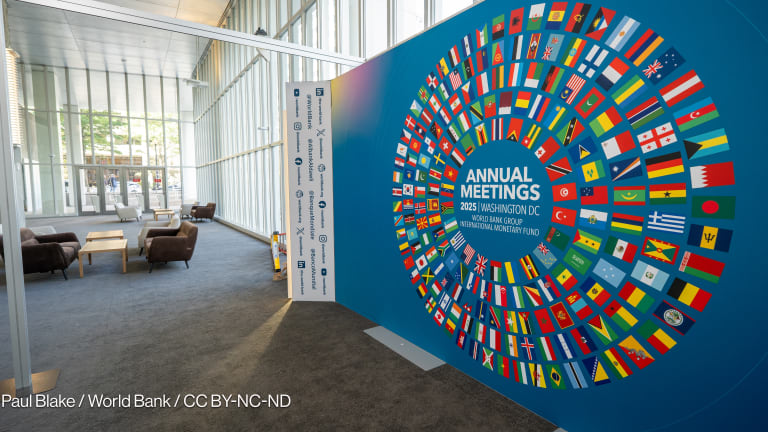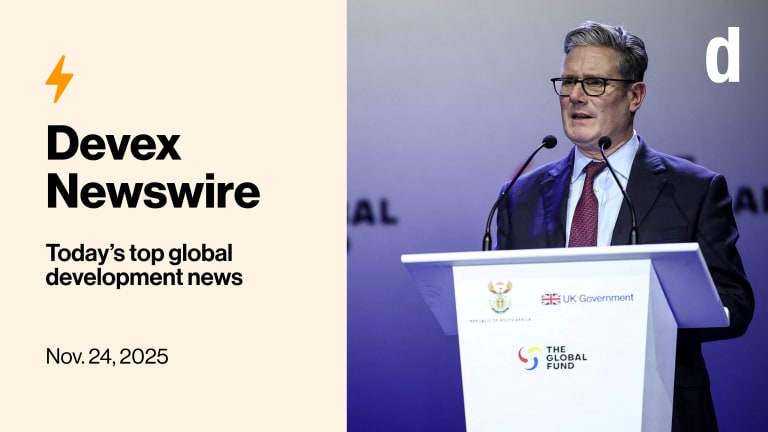Devex Newswire: Britain’s unconventional Special Drawing Rights gambit

In Guatemala, USAID is trying to build local economic opportunities — but there’s an ulterior motive.
This is a preview of Newswire
Sign up to this newsletter for an inside look at the biggest stories in global development, in your inbox daily.
U.S. Vice President Kamala Harris is in Guatemala today, her first visit to Central America since President Joe Biden tasked her with addressing the root causes of migration.
During my trip to Guatemala last month, I looked into the investments USAID is currently making to help people stay in their communities and not feel the need to migrate. The agency has prioritized private-sector partnerships to encourage job creation in regions of the country with the highest rates of out-migration, such as the Western Highlands.
I visited two USAID-funded agricultural programs that are helping create opportunities in rural communities. But the agency acknowledges the constraints of such activities — which often help isolated communities find economic opportunity, but not at the scale needed that it would take to have a measurable impact on Guatemala’s overall migration rate.
Read: How supporting Guatemala's farmers keeps them rooted at home
Once you’ve given it a read, let me know what you think! What are the merits of this model, and what are its limitations? Should the U.S. be using its aid as migration deterrence? Get in touch at teresa.welsh@devex.com.
Cash rules
In August, the International Monetary Fund is expected to issue about $650 billion in Special Drawing Rights — a type of reserve currency often lauded as “free money” — to shore up governments shaken by the economic effects of the pandemic.
But the British government, in an extraordinary move, may be looking to use its share of SDRs as part of its 0.5% aid target. Doing so would be unprecedented, and could mean the U.K. development sector, already strained by deep monetary cuts, would see even less money. But that doesn’t mean all hope is lost. Will Worley and Adva Saldinger have the exclusive.
Today, a group of conservative rebels in Parliament is attempting to legally bar Prime Minister Boris Johnson’s government from reducing the aid budget from 0.7% of national income to 0.5%, which could be a game-changer.
Read: Exclusive: UK to charge Special Drawing Rights to aid budget — sources
ICYMI: UK government faces surprise vote on aid cuts
Act locally
“We will be watching to ensure good intentions become reality, as too often in Geneva, hefty words do not travel well.” — Jaume Vidal, senior policy adviser at Health Action International
The impact of a resolution on strengthening local medicine production passed last month at the World Health Assembly will depend on WHO member states’ political will — and the regulatory capabilities of regional and sub-regional entities, Jenny Lei Ravelo reports.
While the resolution is expected to strengthen WHO’s role in helping countries improve their regulatory systems, it’s also unclear how European countries will coordinate the creation of
pharmaceutical manufacturing hubs in Africa,
Calling for reinforcements
On Friday, USAID Administrator Samantha Power announced the creation of a new position at the agency: A new deputy administrator will provide overall strategic guidance to the bureaus for humanitarian assistance; conflict prevention and stabilization; resilience and food security; development, democracy, and innovation; and global health; as well as the five regional bureaus. That role will join the existing deputy administrator, who Power says will continue to be the chief operating officer and “focus on the Agency’s management and resources issues.”
The current bureau structure is the product of an agency reorganization spearheaded by former administrator Mark Green, which largely found widespread support throughout USAID.
Devex Pro: Meanwhile, our data analytics team explores USAID’s COVID-19 funding in 2020 — and which contractors got the biggest windfalls.
Back to work
Following the lead of IMF, the World Bank’s D.C. headquarters has begun bringing staff back to in-person work, with a goal of having 10% back at their desks by June 14 and 50% by September. Many of the bank’s offices across other continents are still completely closed.
In other news
G-7 countries have agreed on a landmark deal to make multinational companies pay a minimum 15% tax rate in each country where they operate. [BBC]
The U.S. on Friday announced a new $266 million aid package for Afghanistan, as troop withdrawal from the country nears. [Reuters]
The World Bank has suspended payments to its operations in Mali, following the military overthrow of the country's transitional president and prime minister in May. [France 24]
Sign up to Newswire for an inside look at the biggest stories in global development.
Search for articles
Most Read
- 1
- 2
- 3
- 4
- 5








